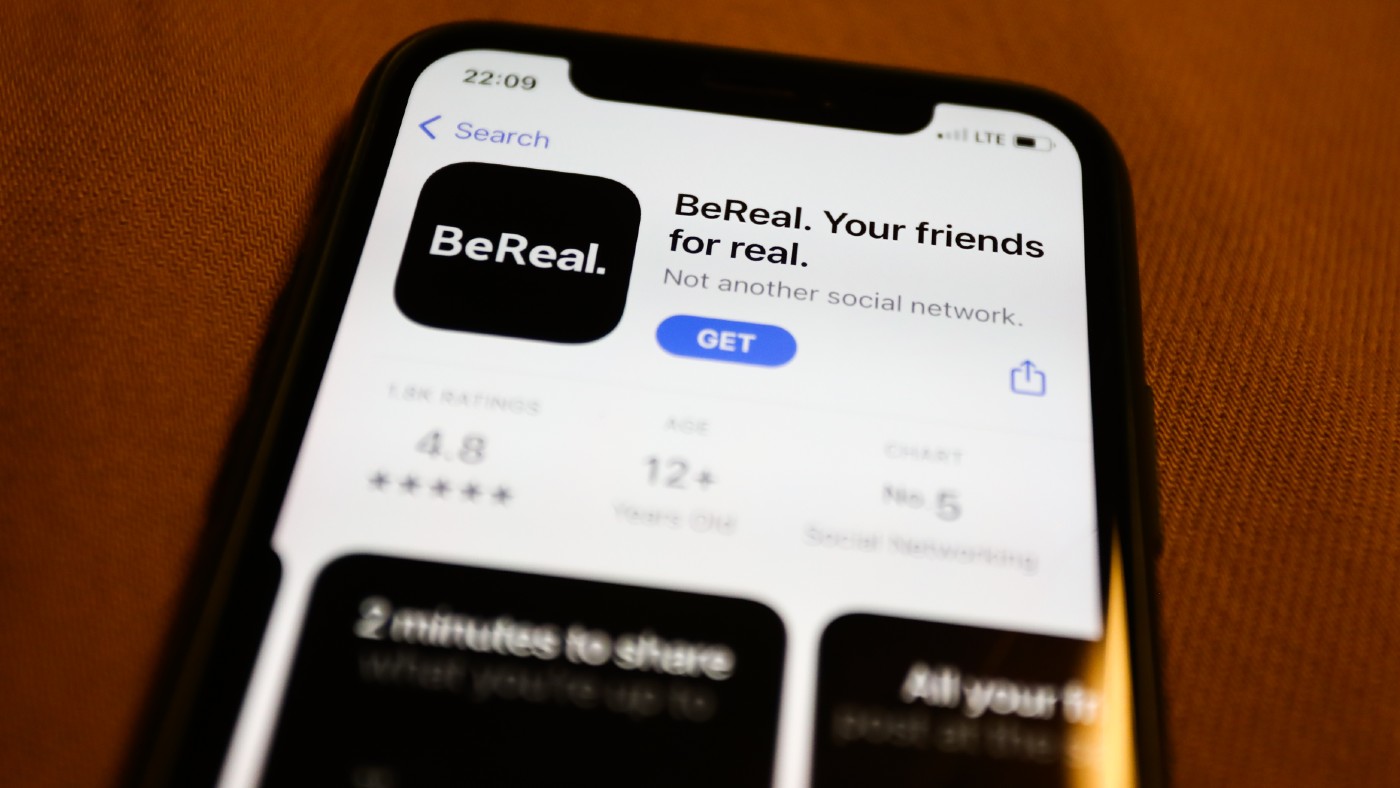BeReal: the ‘unfiltered’ social media platform taking Gen Z by storm
The simultaneous photo-sharing app promises authentic snapshots of users’ daily lives

A free daily email with the biggest news stories of the day – and the best features from TheWeek.com
You are now subscribed
Your newsletter sign-up was successful
A photo-sharing platform showing warts-and-all photos of users’ everyday lives is taking on the likes of Instagram as young social-media fans reject the filtered images favoured on rival apps.
BeReal enables users to see “your friends for real”, according to the image-only app’s tagline. The basic idea is that “every day at a different time, everyone is notified simultaneously to capture and share a photo in two minutes”.
And the concept is going down a storm with Gen Z, with BeReal this week becoming the No.1 non-gaming app in the US Apple App Store.
The Week
Escape your echo chamber. Get the facts behind the news, plus analysis from multiple perspectives.

Sign up for The Week's Free Newsletters
From our morning news briefing to a weekly Good News Newsletter, get the best of The Week delivered directly to your inbox.
From our morning news briefing to a weekly Good News Newsletter, get the best of The Week delivered directly to your inbox.
How does it work?
BeReal aims to provide “a judgment-free environment where users get a realistic look at what their friends are up to on a daily basis, no matter how mundane or exciting their updates are”, said Time magazine.
Although users are encouraged to capture and share unfiltered back- and front-facing photos within two minutes of receiving their daily notification, there are “virtually no consequences” for lateness, said Elite Daily.
Other users will be able to see how late the post was, thanks to a time stamp on the post, but “nothing will happen to your account” for being tardy or for just not posting at all, said the Gen Z-focused news site. After all, “sometimes you’re just too busy to take two minutes out of your day for a BeReal post”.
However, The Verge argued that allowing users to post their photos late is a “fatal flaw” that is “heavily interfering” with achieving BeReal’s mission. Because there is no punishment for posting late, “there is very little stopping people from using this app the exact same way they use Instagram stories”.
A free daily email with the biggest news stories of the day – and the best features from TheWeek.com
Critics also point out that “you can retake your photo as many times as you need” within the two minutes after getting the daily notification, said Elite Daily. But “be warned that users with ten or more friends will be able to see the number of attempts you took”.
Unlike other photo-centric apps, friends can only see each other’s BeReal posts if they also share an image, and previous photos disappear from the feed as soon as a new one is uploaded.
And if another user takes a screenshot of a BeReal, the person who posted the image is alerted via a small icon. If the image is then shared on another social media platform, such as Instagram or Twitter, the culprit can be identified.
Who created BeReal?
BeReal was launched in December 2019 by French entrepreneurs Alexis Barreyat and Kévin Perreau, who previously worked at activity image capture company GoPro and consulting firm Opteamis respectively. According to productmint, the duo met “when they attended the French coding school 42 born2code, which was started by billionaire Xavier Niel”, co-owner of Le Monde newspaper.
Barreyat and Perreau spent most of 2020 “refining” BeReal, said the tech site. But “their patience would soon pay off”, as downloads “began to spiral” to tens of thousands a month.
Following a year of steady growth, BeReal has exploded in popularity in recent months. Apptopia reported this week that the app had been downloaded a total of 43.3m times. Almost 41m of those downloads have been this calendar year, with the US “contributing 40% of new users”, said the site.
Does the app have longevity?
A string of other social media apps, such as audio-only platform Clubhouse, have previously attracted huge numbers of users before “fading swiftly back into obscurity”, said The Observer. “Gimmicky features” such as BeReal’s daily nudges can “eventually turn from compulsive to irritating”.
The Sydney Morning Herald agreed that while BeReal is “off to a flying start”, users may tire of “watching people posting in their offices and bedrooms”. And even if the app succeeds in building “a loyal and substantial user base, there are questions about its ability to leverage this into a viable business”, the paper continued.
Social media platforms “are usually monetised through advertising, which depends on corporations paying for your attention – the antithesis of BeReal’s existing proposition”.
Kate Samuelson is The Week's former newsletter editor. She was also a regular guest on award-winning podcast The Week Unwrapped. Kate's career as a journalist began on the MailOnline graduate training scheme, which involved stints as a reporter at the South West News Service's office in Cambridge and the Liverpool Echo. She moved from MailOnline to Time magazine's satellite office in London, where she covered current affairs and culture for both the print mag and website. Before joining The Week, Kate worked at ActionAid UK, where she led the planning and delivery of all content gathering trips, from Bangladesh to Brazil. She is passionate about women's rights and using her skills as a journalist to highlight underrepresented communities. Alongside her staff roles, Kate has written for various magazines and newspapers including Stylist, Metro.co.uk, The Guardian and the i news site. She is also the founder and editor of Cheapskate London, an award-winning weekly newsletter that curates the best free events with the aim of making the capital more accessible.